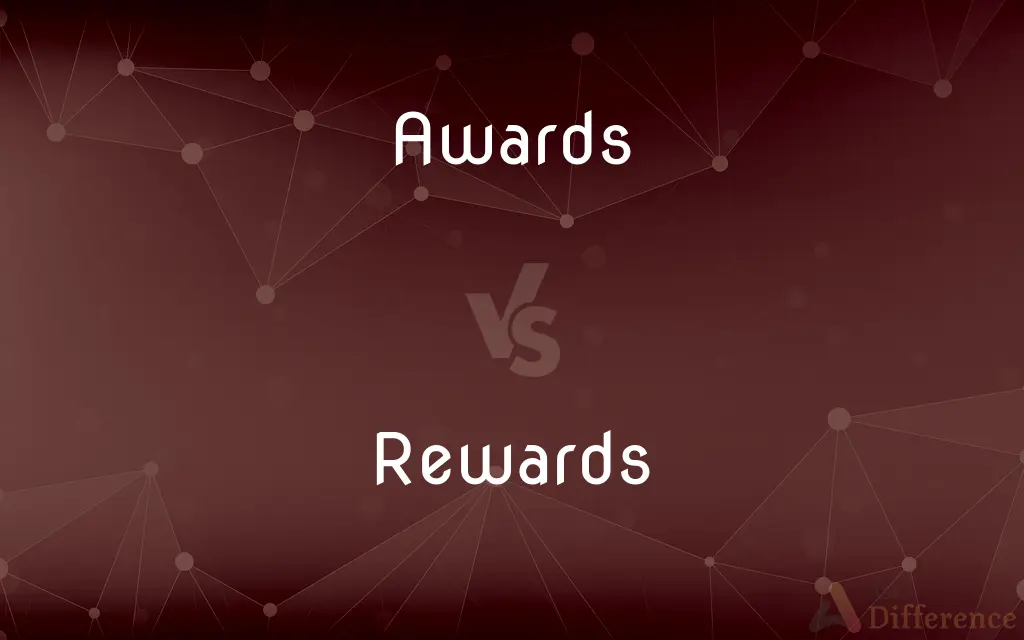Awards vs. Rewards — What's the Difference?
By Tayyaba Rehman & Urooj Arif — Published on February 13, 2024
Awards are honors given for achievements, often publicly, while rewards are incentives or compensations given for specific actions or behaviors.

Difference Between Awards and Rewards
Table of Contents
ADVERTISEMENT
Key Differences
Awards and Rewards, while often used interchangeably in casual conversation, hold distinct meanings and implications in various contexts. Awards are typically given in recognition of achievements or excellence in a particular field or activity. They are often public and ceremonial, marking significant accomplishments or contributions. Rewards, on the other hand, are given as a form of compensation or incentive for a specific action or behavior, and they can be either tangible or intangible, personal or professional.
Awards are often associated with a formal recognition process, such as trophies, titles, certificates, or medals, and are bestowed by an organization, committee, or group. They serve to acknowledge the recipient's hard work, talent, or contribution to a particular field. Rewards, conversely, are more closely tied to motivation and behavior reinforcement, used in various settings, from workplaces to educational institutions, to encourage desired actions or outcomes.
The nature of awards is largely celebratory and honorific, highlighting the recipient's surpassing of standards or notable achievement among peers. They carry a sense of prestige and are usually accompanied by ceremonies or announcements. Rewards, however, are more personal and direct, often given as a response to specific criteria being met, such as completing a task, reaching a goal, or exhibiting desired behavior, and may not always involve public recognition.
In the context of motivation and engagement, awards play a crucial role in setting benchmarks and inspiring others towards excellence, creating a culture of achievement and recognition. Rewards, by their nature, foster immediate motivation and satisfaction, serving as a tangible acknowledgment of effort or progress towards a goal. Both awards and rewards are vital in their respective domains, but they cater to different aspects of recognition and motivation.
To sum up, while awards and rewards both serve to acknowledge and encourage positive outcomes, they differ in their application, purpose, and impact. Awards celebrate achievements and set standards of excellence, whereas rewards provide immediate motivation and satisfaction for specific actions or behaviors.
ADVERTISEMENT
Comparison Chart
Nature
Honorific and ceremonial
Incentive-based and compensatory
Purpose
Recognize achievements or excellence
Motivate or compensate for specific actions
Form
Trophies, medals, titles, certificates
Bonuses, gifts, privileges, acknowledgments
Context
Often public and formal
Can be private or public, often more personal
Recipient Criteria
Achieving excellence or surpassing standards
Meeting specific criteria or exhibiting desired behavior
Compare with Definitions
Awards
Marks outstanding achievement in a field.
The Pulitzer Prize is an award for achievements in newspaper and online journalism.
Rewards
Can be monetary, such as bonuses, or non-monetary, like privileges.
The company offered a weekend getaway as a reward for the best team.
Awards
Recognition given for achievement or excellence.
She received an award for Best Actress.
Rewards
Compensation given for a service or achievement.
Employees receive rewards for meeting their quarterly targets.
Awards
Bestowed by an organization or committee.
He was honored with a lifetime achievement award by the industry association.
Rewards
Personal and directly tied to specific actions.
She earned a reward for finding and returning the lost wallet.
Awards
Celebrated with ceremonies and public acknowledgment.
The annual awards gala celebrates the best in film.
Rewards
Can be tangible or intangible acknowledgments of effort.
The manager's praise was a rewarding acknowledgment of the team's hard work.
Awards
Often a trophy, medal, or certificate signifying honor.
The Nobel Prize is one of the most prestigious awards.
Rewards
A consequence that happens to someone as a result of worthy or unworthy behavior
The rewards of exercise.
The rewards of lying to your boss.
Awards
To grant as merited or due
Awarded prizes to the winners.
Rewards
Money offered or given for some special service, such as the return of a lost article or the capture of a criminal.
Awards
To grant an amount or other benefit legally due
Awarded damages to the plaintiff.
Rewards
A satisfying return on investment; a profit.
Awards
Something awarded or granted, as for merit.
Rewards
(Psychology) The return for performance of a desired behavior; positive reinforcement.
Awards
An amount or other benefit granted as legally due.
Rewards
To give a reward to or for.
Awards
Plural of award
Rewards
Plural of reward
Rewards
Infl of reward
Rewards
Given as an incentive to motivate specific behaviors.
Students earn rewards for good grades and attendance.
Common Curiosities
Are awards always public?
While awards are often public and accompanied by ceremonies, some can be given privately.
How do rewards differ from awards?
Rewards are incentives or compensations for specific actions, not necessarily tied to public recognition.
Can rewards be non-monetary?
Yes, rewards can include non-monetary incentives like privileges, gifts, or even verbal praise.
What role do awards play in motivation?
Awards set benchmarks for excellence and inspire others to achieve similar recognition.
How do rewards affect behavior?
Rewards encourage specific behaviors or actions through direct compensation or incentives.
What defines an award?
An award is a recognition given for excellence or achievement in a specific field.
How do organizations benefit from giving awards?
Organizations enhance their reputation and encourage a culture of excellence through awards.
Do rewards always follow an achievement?
Rewards are often given for achievements but can also be used as motivation towards a goal.
Can rewards be given in a group setting?
Yes, rewards can be given to teams or groups for collective achievements or efforts.
What is the significance of award ceremonies?
Ceremonies celebrate achievements and publicly acknowledge the recipients' excellence.
What makes a reward effective?
An effective reward is timely, relevant to the recipient's desires, and proportional to the effort or achievement.
Can an individual receive both an award and a reward for the same achievement?
Yes, an individual could receive an award for the recognition of achievement and a reward as a form of incentive or compensation.
Are awards limited to the arts and entertainment industries?
No, awards are given in various fields, including science, sports, academics, and more.
Can awards be revoked?
In rare cases, awards can be revoked if the recipient is later found to have violated certain terms.
How do cultural differences impact the perception of awards and rewards?
Cultural values can influence what is considered award-worthy and how rewards are given or received.
Share Your Discovery

Previous Comparison
Kurlon Mattress vs. Sleepwell Mattress
Next Comparison
Valentine’s Day vs. White DayAuthor Spotlight
Written by
Tayyaba RehmanTayyaba Rehman is a distinguished writer, currently serving as a primary contributor to askdifference.com. As a researcher in semantics and etymology, Tayyaba's passion for the complexity of languages and their distinctions has found a perfect home on the platform. Tayyaba delves into the intricacies of language, distinguishing between commonly confused words and phrases, thereby providing clarity for readers worldwide.
Co-written by
Urooj ArifUrooj is a skilled content writer at Ask Difference, known for her exceptional ability to simplify complex topics into engaging and informative content. With a passion for research and a flair for clear, concise writing, she consistently delivers articles that resonate with our diverse audience.











































